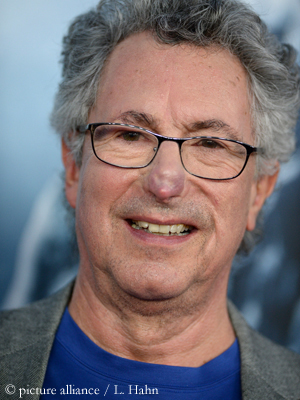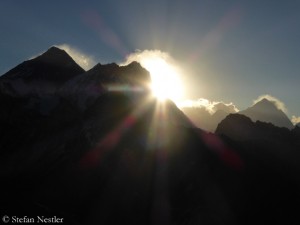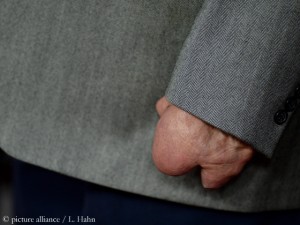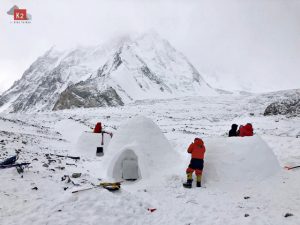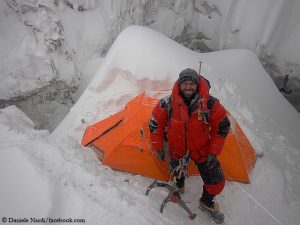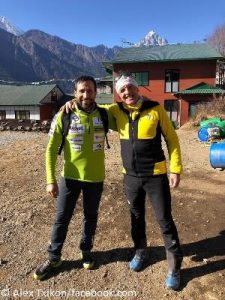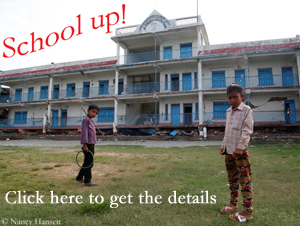Beck Weathers: “It made my life more rewarding”
The Everest summit wave is rolling. Dozens, if not hundreds of summit successes are expected these days, on the Nepalese south side of the highest mountain on earth as well as on the Tibetan north side. Do the Everest aspirants still remember Beck Weathers? Possibly. After all, in 2015 the successful Hollywood movie “Everest” told his story. 20 years ago, in spring 1996, Beck also wanted to climb to the top of the world. Due to vision problems the American pathologist had to abandon his summit attempt at about 8,400 meters. Later he was caught in the storm that cost the lives of eight climbers within 24 hours.
It’s a miracle that Weathers survived. Actually, he was already as good as dead. After a night in whiteout his fellow climbers left him lying in the snow supposing he was dead. But Beck regained consciousness and despite severe frostbite he dragged himself to Camp 4. A rescue team brought him down to Camp 2 at 6,400 meters, from where Beck was brought to safety with a spectacular helicopter flight. Weathers’ right arm had to be amputated just below the elbow. Beck also lost all fingers of the left hand. His frostbitten nose had to be reconstructed in numerous operations.
I have contacted Beck Weathers on the occasion of the 20th anniversary of the 1996 Everest disaster. Because the 69-year-old was traveling, he has sent me his answers to my questions only a few days after the anniversary.
Beck, the 1996 Everest disaster was probably one of your most profound experiences. In what way has it changed your life?
It was a two by four across my face that absolutely forced me to change my priorities in the way that I was living. I am proud of that. I defined myself by accomplishment, by externalities. And I really was never comfortable in my own skin. It forced me to change. I have now managed to achieve a certain level of peace in my life becoming perhaps more comfortable with who I am. And I live day to day much more so than I ever have in the past. Actually, it made my whole life a lot more peaceful and more rewarding.
Beck Weathers: It made my life more peaceful and rewarding
I suppose you might often have wondered how you were able to survive this situation that you described in your book as “Left for dead”. How do you explain the seemingly impossible, 20 years later?
Well, I have given that a great deal of thought. I really don’t know the answer to that question. I have looked at it from the most spiritual to the most physical because as far as I know I am the only individual in mountaineering history to go into hypothermic coma in the high mountains and come back out of it. I think the spiritual largely speaks for itself. The physical: The sun even in the storm when it is out fully during the day on a very high mountain like that is incredibly strong. The clothes that you are wearing are designed to absorb the heat. And ultimately it only has to raise your body temperature a little bit to where you are able to regain consciousness, open your eyes. And at that point the decision on getting up and moving versus surrender is entirely up to you.
Beck Weathers: Moving versus surrender
There was a public blame game after the disaster. How do you feel about that now?
Following the disaster, the blame game went on hard and heavy. I really made a very conscious decision that I did not want to go down that road, mostly because I thought it would be self-destructive if I had started to think about who I needed to blame for this. That would make me angry and focus my emotions and attention in areas that I think would be very unhealthy. It was my decision to be there, my legs took me there. And ultimately I was able to walk back to the high camp. And truly, if there is anybody to blame it’s myself for it happened to me. I am not going to go down the road: Why didn’t you bail me out, why didn’t you save my bacon? I think, that is a terribly destructive approach. You got to take responsibility for your own actions.
Beck Weathers: Take responsibility for your own actions
If you could turn back time and had the opportunity to revise your decision to go to Everest in 1996, would you do it again, despite the pain, the aftermath, the loss?
Even though I would not have thought of this to be true at the time – yes, I would, because I got so much more out of it than I gave up. By forcing me to reexamine how I was living my life, it ultimately saved my marriage, saved my relationship with my kids. And it has given me 20 years which have been the absolute most interesting and best years of my life. So I gave up some body parts but I gained so much more. So I would do it again in a heart beat.
Beck Weathers: I would do it again in a heart beat
Are you still following what happens on Mount Everest – and if yes, with what feelings?
When something really happens and it’s of interest, like the rest of the world I turn in, whether it was the avalanche that killed 16 Sherpas in 2014 or last year’s avalanche from Pumori into Base Camp. Those things do force you to go back and think about Everest and what’s happing there on the mountain and to a certain extent how it has changed over the years. I never had any unhappiness looking back at Everest. I’ve never had nightmares, nothing about it has bothered me. It’s just one of those things that occurred, it’s part of my life, I accept it. And I don’t look back and have any feelings of regret. I just accept what life has offered me. And I hopefully have managed to be a better individual for the challenge that it has given me.



